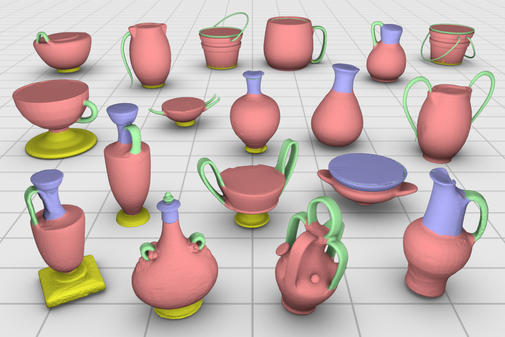Geometry processing (COMP 5115F) - Fall 2019

Outline
The course covers concepts, representations, and algorithms for analyzing and processing 3D geometric models. We will discuss the geometry processing pipeline that starts with the acquisition of geometric models (e.g., with laser scanning or stereo imaging) and goes all the way to the fabrication (3D printing) of the models. More specifically, we will discuss the tasks of acquisition, reconstruction, analysis, manipulation, editing, and fabrication of complex 3D models, and representations such as triangle meshes and implicit functions. The techniques covered have applications in computer graphics, engineering, medical imaging, and many other areas, while the field is still the subject of much active work and presents opportunities for future research.
Topics
- Surface representations and mesh data structures
- Mesh reconstruction
- Mesh smoothing and fairing
- Mesh simplification and compression
- Parameterization
- Mesh editing and deformation
- Shape analysis
- 3D printing and fabrication
Learning outcomes
At the end of this course, students will be able to:
- Summarize the main problems and solution methods in the field of geometry processing.
- Identify the most suitable techniques to address specific problems in geometry processing.
- Implement algorithms for processing of polygonal meshes and apply them to specific datasets.
Pre-requisites
Experience with C++ programming, familiarity with linear algebra (vectors, matrices, etc.), and eagerness to study mathematical concepts and algorithms. Familiarity with computer graphics and/or computer vision and/or image processing are a plus.
Recommended book
M. Botsch, L. Kobbelt, M. Pauly, P. Alliez, and B. Levy, "Polygon Mesh Processing", A K Peters/CRC Press, 2010.
We will follow this book closely in the first part of the course. Each topic will also have additional references and suggested readings.
Lectures
Tuesdays and Thursdays, 11:35am-12:55pm, Richcraft Hall 1200.
Grading
The grade will be based on a paper presentation, assignments and a final course project.
Instructor
Oliver van Kaick.
You can find more information about the course (such as a detailed list of topics) at cuLearn. You can also e-mail me at Oliver.vanKaick at carleton dot ca for any questions regarding the course.